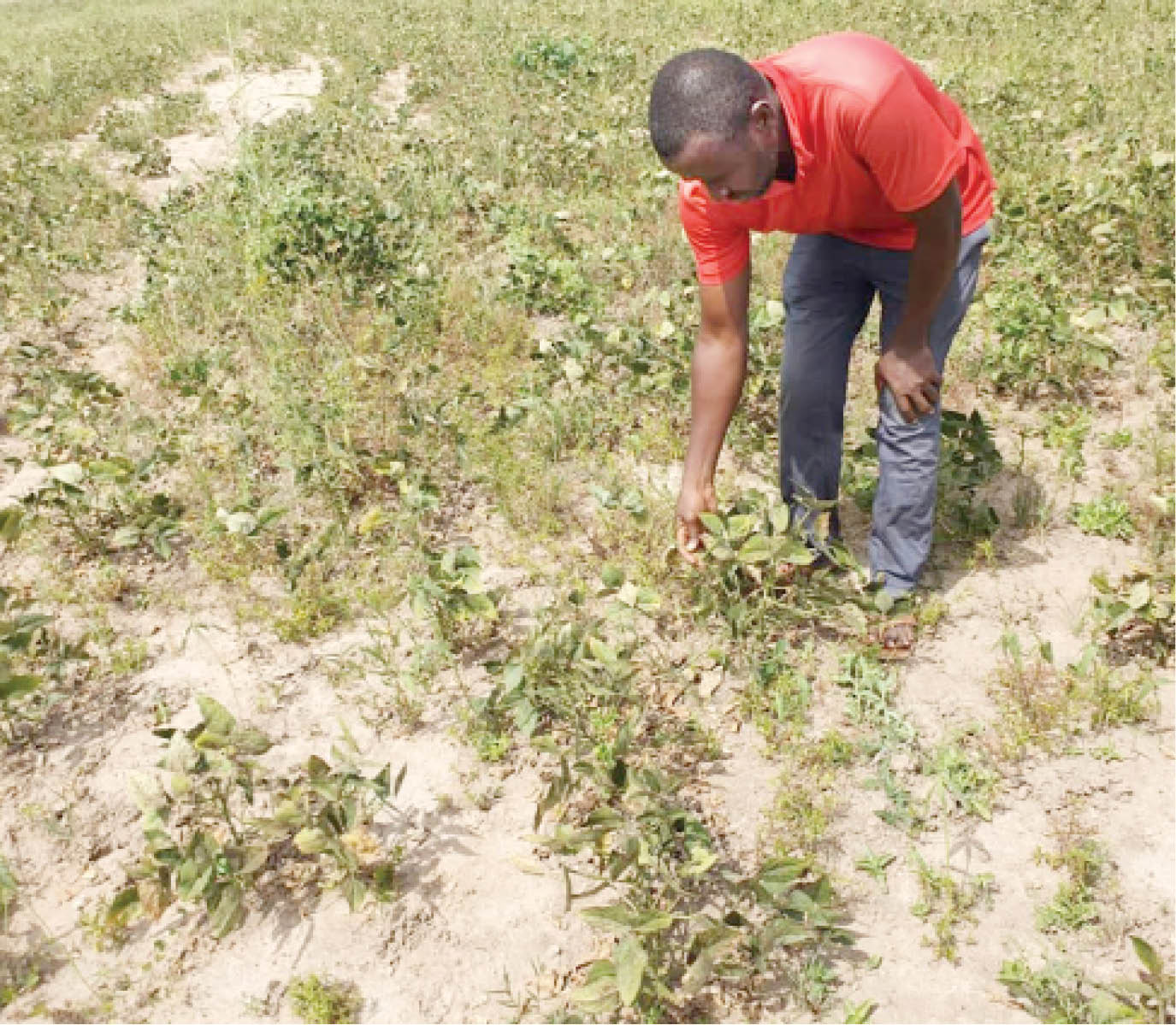Benue cowpea farmers count loses amidst poor harvest
Cowpea farmers in Benue State are not excited about their harvest at the end of last year as most of them complained of poor outcomes. Daily Trust on Sunday spoke to some of the farmers across the state, who described their harvest as poor when compared with previous years. Gunmen kill livestock guard in Benue […]

Tarnongu in his cowpea farm completely lost to drought
Cowpea farmers in Benue State are not excited about their harvest at the end of last year as most of them complained of poor outcomes.
Daily Trust on Sunday spoke to some of the farmers across the state, who described their harvest as poor when compared with previous years.
One of them, Vitalis Tarnongu, a big cowpea farmer in the state, said harvest in 2020 was very poor, adding that the plant produced flowers that could not metamorphose into seeds.
He attributed factors that determined the poor harvest to early stoppage of rain, saying he suffered much losses because he planted cowpea on 16 hectares of farmland and lost the entire farm to drought.
At the initial projection during the planting period, Tarnongu expected at least one tonne of harvest per hectare, which could have turned out at a total of 16 tonnes during the reaping period, but that never materialised.
Now, to improve on the next season’s harvest, he is currently looking at installing irrigation facilities to avert similar occurrence and also going for drought-resistant variety of cowpea seeds.
He believes the government, as well as cooperate bodies, could help to ensure that next season’s harvest becomes better by assisting smallholder farmers, and by establishing farming villages, where irrigation facilities can be installed since the installation of irrigation facilities is highly capital intensive.
He added that corporate bodies could also help in the sponsorship of breeders to develop drought-resistant varieties of cowpea, while establishment of weather stations by government that would provide adequate and precision weather data to guide the farmer during planting would go a long way to mitigate harvest losses.
Tarnongu also observed that the COVID-19 pandemic affected farmers like him in some ways because they ran short of inputs as there was difficulty in moving inputs to them due to lockdown.
He estimates that food security would be affected by the poor outcome of the 2020 harvest as there would probably be food shortage.
In the same vein, Mrs Margret Elijah, a consistent cowpea farmer in the Ugboju-Otukpo area of the state, described her harvest as very poor, saying it was because of the two-month drought that occurred at the infancy stage of the plants in her farm.
Mrs Elijah said the insufficient rainfall impacted negatively on the cowpea production in her farm, which previously yielded well.
“I didn’t have a good harvest. That means my family won’t have enough cowpea for consumption. And there won’t be any for sale to generate income; and the market, by implication, will witness short supply of cowpea,’’ she said.
The story by another cowpea farmer, James Toryila from the Guma area of the state wasn’t different. Lamenting his helplessness, he noted that the financial hardship he encountered during the planting dates of his cowpea farm made him unable to strictly abide by the best practice.
Toryila added that besides lack of financial support to acquire the recommended inputs for his farm, the COVID-19 pandemic, as well as drought, impacted negatively on his farm; hence the poor harvest.
On his part, the chairman of the All Farmers Association of Nigeria (AFAN) in Benue State, Comrade Aondongu Saaku, lamented that cowpea harvest was poor across the state in 2020.
He said, “In fact, poor harvest was the unique complaint among cowpea farmers in the state. And that happened basically due to the August 2020 drought, which dried up the plants.
Also, the early cessation of rain contributed to the poor harvest. I can say that 50 per cent of the harvest was lost in the state.’’
He said the poor harvest would affect food security in the state, and therefore, advised farmers not to sell their produce now to avoid buying it costly later in the year.
Saaku said the development would threaten merchants purchasing cowpea in bulk at this period, just as he encouraged farmers to key into dry season farming as a means to mitigate the poor harvest.
Examining the complaints by farmers, a cowpea seed system specialist, Dr Teryima Iorlamen of the Federal University of Agriculture, Makurdi (FUAM), blamed farmers’ woes on early stoppage of rain.
“We will still look into the planting date. Most of them planted late. They should take advice from us. Get the recommendations from us (FUAM) because ours was not bad,’’ he posited.
Iorlamen, also a cowpea principal investigator, attributed the poor harvest to high cost of inputs, such that some of the farmers couldn’t afford to apply necessary recommendations.
He, however, pointed out that the choice of variety to plant remains a significant step in crop production, adding that in 2020, most of the farmers who planted FUAMPEA 1 and SAMPEA14 had no reason to regret.
“This is due to their adaptation to the Benue environment and the fact that they are early maturing varieties. Farmers around the Benue environment are advised to contact the principal investor of AVISA cowpea seed systems, molecular biology laboratory, College of Agronomy, FUAM for improved seeds and technical advice.
In cowpea seed production we advise farmers to buy all the inputs and keep before the season begins. Sometimes the inputs are cheaper off season,’’ the cowpea expert stressed.
